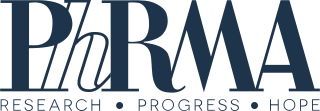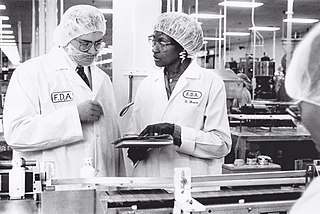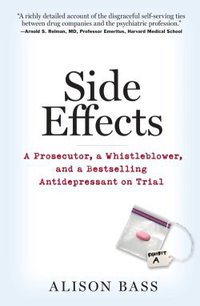Related Research Articles


Novartis AG is a Swiss multinational pharmaceutical corporation based in Basel, Switzerland. Consistently ranked in the global top five, Novartis is one of the largest pharmaceutical companies in the world and was the fourth largest by revenue in 2022.

Pharmaceutical Research and Manufacturers of America, formerly known as the Pharmaceutical Manufacturers Association, is a trade group representing companies in the pharmaceutical industry in the United States. Founded in 1958, PhRMA lobbies on behalf of pharmaceutical companies. PhRMA is headquartered in Washington, DC.

GSK plc, is a British multinational pharmaceutical and biotechnology company with global headquarters in London. Established in 2000 by a merger of Glaxo Wellcome and SmithKline Beecham, GSK is the tenth largest pharmaceutical company and #294 on the 2022 Fortune Global 500, ranked behind other pharmaceutical companies China Resources, Sinopharm, Johnson & Johnson, Pfizer, Roche, AbbVie, Novartis, Bayer, and Merck Sharp & Dohme.

The pharmaceutical industry discovers, develops, produces, and markets pharmaceutical drugs for the use as medications to be administered to patients, with the aim to cure and prevent diseases, or alleviate symptoms. Pharmaceutical companies may deal in generic or brand medications and medical devices. They are subject to a variety of laws and regulations that govern the patenting, testing, safety, efficacy using drug testing and marketing of drugs. The global pharmaceuticals market produced treatments worth $1,228.45 billion in 2020 and showed a compound annual growth rate (CAGR) of 1.8%.

Valdecoxib is a nonsteroidal anti-inflammatory drug (NSAID) used in the treatment of osteoarthritis, rheumatoid arthritis, and painful menstruation and menstrual symptoms. It is a selective cyclooxygenase-2 inhibitor. It was patented in 1995.
Many countries have measures in place to limit advertising by pharmaceutical companies.
Pharmaceutical sales representatives are salespeople employed by pharmaceutical companies to persuade doctors to prescribe their drugs to patients. Drug companies in the United States spend ~$5 billion annually sending representatives to doctors, to provide product information, answer questions on product use, and deliver product samples. These interactions are governed according to limits established by the Code on Interactions with Health Care Professionals, created by the Pharmaceutical Research and Manufacturers of America (PhRMA). This code came into practice in 2002 and has since been updated to help define ethical interactions between health care professionals and the pharmaceutical companies
Mylan N.V. was a global generic and specialty pharmaceuticals company. In November 2020, Mylan merged with Upjohn, Pfizer's off-patent medicine division, to form Viatris. Previously, the company was domiciled in the Netherlands, with principal executive offices in Hatfield, Hertfordshire, UK and a "Global Center" in Canonsburg, Pennsylvania, US.

The pharmaceutical lobby refers to the representatives of pharmaceutical drug and biomedicine companies who engage in lobbying in favour of pharmaceutical companies and their products.

Side Effects: A Prosecutor, a Whistleblower, and a Bestselling Antidepressant on Trial is a nonfiction book by investigative journalist Alison Bass that chronicles the lawsuit filed in 2004 against GlaxoSmithKline by then New York Attorney General Eliot Spitzer.
David Franklin is an American microbiologist and former fellow of Harvard Medical School who while employed by Parke-Davis filed the 1996 whistleblower lawsuit exposing their illegal promotion of Neurontin (gabapentin) for off-label uses. Franklin's suit, filed on behalf of the citizens of the United States under the qui tam provisions of US federal and state law, uncovered illegal pharmaceutical industry practices and created new legal precedent that resulted in a cascade of criminal convictions and civil and criminal penalties against Pfizer and several other pharmaceutical companies totalling more than $7 billion. Civil cases also followed Franklin v. Parke-Davis. Insurance companies, led by Kaiser Permanente, sued Pfizer for fraud and violation of the federal Racketeer Influenced and Corrupt Organizations Act; the Kaiser case settled in April 2014 after Pfizer's appeal at the US Supreme Court was rejected. Franklin v. Pfizer also spawned more than a thousand wrongful death (suicide) suits associated with use of Neurontin. Numerous books have addressed the social, economic and healthcare implications of Dr. Franklin's stance and actions. The settlement was the first off-label promotion settlement under the False Claims Act.
The pharmaceutical industry in the United Kingdom directly employs around 73,000 people and in 2007 contributed £8.4 billion to the UK's GDP and invested a total of £3.9 billion in research and development. In 2007 exports of pharmaceutical products from the UK totalled £14.6 billion, creating a trade surplus in pharmaceutical products of £4.3 billion.
Pharmaceutical fraud involves activities that result in false claims to insurers or programs such as Medicare in the United States or equivalent state programs for financial gain to a pharmaceutical company. There are several different schemes used to defraud the health care system which are particular to the pharmaceutical industry. These include: Good Manufacturing Practice (GMP) Violations, Off Label Marketing, Best Price Fraud, CME Fraud, Medicaid Price Reporting, and Manufactured Compound Drugs. Examples of fraud cases include the GlaxoSmithKline $3 billion settlement, Pfizer $2.3 billion settlement, and Merck $650 million settlement. Damages from fraud can be recovered by use of the False Claims Act, most commonly under the qui tam provisions which rewards an individual for being a "whistleblower", or relator (law).

Reuben A. Guttman, born 1959 in New York City, is an American attorney and a founding Partner of Guttman, Buschner & Brooks PLLC ("GBB"), a DC-based plaintiffs' firm His practice involves complex litigation and class actions. He has served as counsel in some of the largest recoveries under the False Claims Act. The International Business Times has called Guttman "one of the world's most prominent whistleblower attorneys," and he has been recognized as a Washingtonian Top Lawyer by Washingtonian Magazine.
These are Wikipedia lists about the pharmaceutical industry. The pharmaceutical industry develops, produces, and markets drugs or pharmaceuticals licensed for use as medications. Pharmaceutical companies are allowed to deal in generic or brand medications and medical devices. They are subject to a variety of laws and regulations regarding the production, testing, and marketing of drugs.

Study 329 was a clinical trial which was conducted in North America from 1994 to 1998 to study the efficacy of paroxetine, an SSRI anti-depressant, in treating 12- to 18-year-olds diagnosed with major depressive disorder. Led by Martin Keller, then professor of psychiatry at Brown University, and funded by the British pharmaceutical company SmithKline Beecham—known since 2000 as GlaxoSmithKline (GSK)—the study compared paroxetine with imipramine, a tricyclic antidepressant, and placebo. SmithKline Beecham had released paroxetine in 1991, marketing it as Paxil in North America and Seroxat in the UK. The drug attracted sales of $11.7 billion in the United States alone from 1997 to 2006, including $2.12 billion in 2002, the year before it lost its patent.
References
- 1 2 3 4 The Editorial Board (November 27, 2015). "Turn the Volume Down on Drug Ads". The New York Times . Retrieved November 27, 2015.
- ↑ Suttle, Rick (2016). "Example of organizational ethics". Houston Chronicle.
- ↑ Collier, R (2009). "Drug development cost estimates hard to swallow". CMAJ. 180 (3): 279–80. doi:10.1503/cmaj.082040. PMC 2630351 . PMID 19188620.
- 1 2 3 4 5 Anderson, Tania (27 June 2003). "Just what the doctor ordered". Baltimore Business Journal.
- ↑ "Financial Crimes to the Public Report 2006". FBI. 2006.
- ↑ "FBI-Health Care Fraud". FBI.
- ↑ "Department of Justice". Department of Justice. 18 March 2015.
- ↑ Duff Wilson (October 2, 2010). "Side Effects May Include Lawsuits". The New York Times.
- ↑ "GlaxoSmithKline". BBC News. 4 July 2012.
- ↑ "GlaxoSmithKline Agrees to Pay $3 Billion in U.S. Drug Settlement". Bloomberg. 2 July 2012.
- ↑ Fred Mogul (2 July 2012). "NY to Get Millions in GlaxoSmithKlein Settlement". WNYC. Archived from the original on 19 April 2013. Retrieved 2 July 2012.
- ↑ "BBC News -GlaxoSmithKline to pay $3bn in US drug fraud scandal". BBC Online . 2012-07-02. Retrieved 2 July 2012.
- ↑ Thomas, Katie; Schmidt, Michael S. (July 2, 2012). "Glaxo Agrees to Pay $3 Billion in Fraud Settlement". The New York Times. Retrieved July 3, 2012.
- ↑ Sammy Almashat, M.D., M.P.H., Charles Preston, M.D., M.P.H., Timothy Waterman, B.S., Sidney Wolfe, M.D., Rapidly Increasing Criminal and Civil Monetary Penalties Against the Pharmaceutical Industry: 1991 – 2010, Public Citizen’s Health Research Group, December 16, 2010
- ↑ Thomas, Katie; Schmidt, Michael S. (2012-07-02). "GlaxoSmithKline Agrees to Pay $3 Billion in Fraud Settlement". The New York Times.
- ↑ "USDOJ: GlaxoSmithKline to Plead Guilty and Pay $3 Billion to Resolve Fraud Allegations and Failure to Report Safety Data". Justice.gov. 2012-07-02. Retrieved 2013-09-06.
- ↑ "Archived copy" (PDF). Archived from the original (PDF) on 2013-10-29. Retrieved 2020-11-22.
{{cite web}}: CS1 maint: archived copy as title (link) - ↑ "USDOJ: Abbott Labs to Pay $1.5 Billion to Resolve Criminal & Civil Investigations of Off-label Promotion of Depakote". Justice.gov. 2012-05-07. Retrieved 2013-09-06.
- ↑ "#09-038: Eli Lilly and Company Agrees to Pay $1.415 Billion to Resolve Allegations of Off-label Promotion of Zyprexa (2009-01-15)". Justice.gov. Retrieved 2013-09-06.